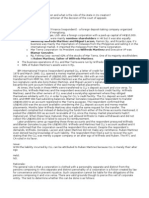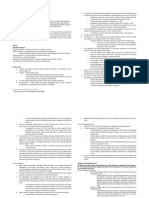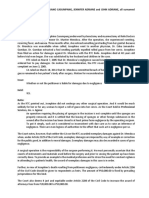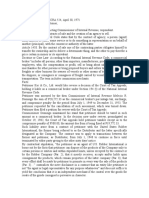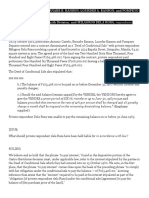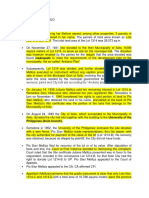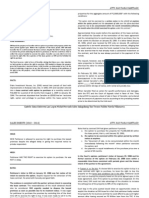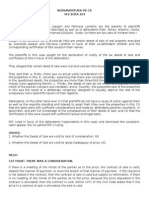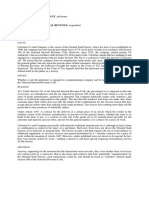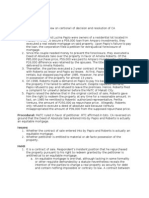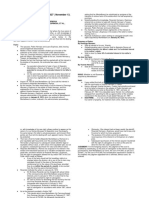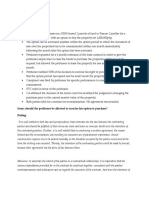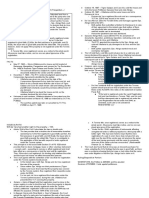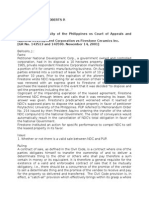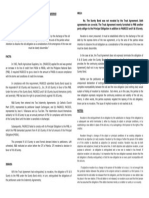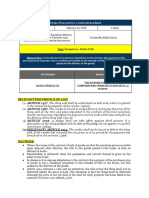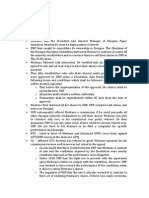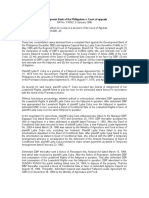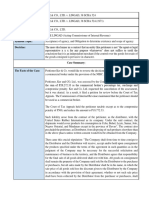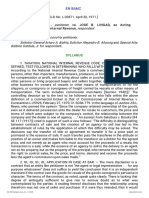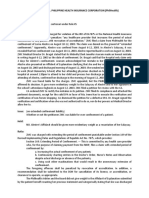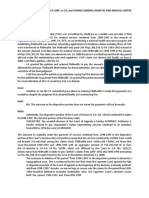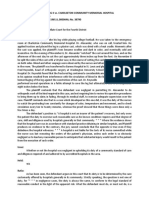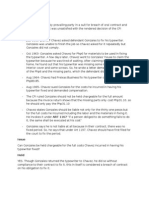Ker & Co LTD Vs Lingad
Ker & Co LTD Vs Lingad
Uploaded by
Dani EsequeCopyright:
Available Formats
Ker & Co LTD Vs Lingad
Ker & Co LTD Vs Lingad
Uploaded by
Dani EsequeOriginal Title
Copyright
Available Formats
Share this document
Did you find this document useful?
Is this content inappropriate?
Copyright:
Available Formats
Ker & Co LTD Vs Lingad
Ker & Co LTD Vs Lingad
Uploaded by
Dani EsequeCopyright:
Available Formats
14. KER & CO LTD. Vs LINGAD Topic: F. Distinguished from or compared with other relations: 6.
Sale (Art 1458) Nature: Petition to reverse a decision of the Court of Tax Appeals Facts: The then Commissioner of Internal Revenue Domingo assessed the petitioner to pay Php20,272 as commercial brokers percentage tax. The petitioner requested for its cancellation but was denied and deemed liable as an agent of United States Rubber International, referred here as the Company. The petitioner was the Companys distributor. Their contract provides that the petitioner, as distributor, cannot dispose of the products for shipment elsewhere than the designated places. But the crucial stipulations state that 1) the consignment remains property of the Company until sold by the distributor and 2) the distributor is not constituted as an agent of the Company by this contract for any purpose whatsoever. Issue: WON the petitioner should be liable for the commercial brokers percentage tax as the agent of the company given the stipulation in their contract Held: YES Rationale: The Court of Tax Appeals was correct in deciding that the petitioner Ker & Co., Ltd is, by contractual stipulation, an agent of the Company as all the circumstances are antagonistic to the idea of an independent merchant. According to the National Internal Revenue Code, a commercial broker includes all persons who, for compensation or profit, sell or bring about the sales or purchase of merchandise for other persons, or bring proposed buyers together The test to see who falls under this definition was penned by Justice JBL Reyes in CIR vs Constantino stating since the company retained ownership of the goods, the price and the terms subject to it, the relationship of the company and the dealer is one of agency. Salisbury vs Brooks support this view stating that if the transfer of title puts the transferee in the attitude or position of an owner and makes him liable to the transferor as a debtor for the agreed price, and not merely as an agent who must account for the proceeds of a resale, it is a sale; while the essence of an agency to sell is the delivery to an agent, not as his property, but as the property of the principal, who remains the owner and has the right to control sales, fix the price and terms, demand and receive the proceeds less the agents commission upon sales made.
You might also like
- Martinez Vs CADocument2 pagesMartinez Vs CADani Eseque100% (1)
- Pichel Vs Alonzo DigestDocument2 pagesPichel Vs Alonzo DigestJoanna Mandap100% (1)
- Engineering and Machinery Corporation v. CADocument2 pagesEngineering and Machinery Corporation v. CAJenine QuiambaoNo ratings yet
- Gaite Vs Fonacier Case DigestDocument2 pagesGaite Vs Fonacier Case Digestellen joy chan100% (4)
- Noel v. CADocument3 pagesNoel v. CAIldefonso HernaezNo ratings yet
- Resolution - Dissolution of CorpDocument2 pagesResolution - Dissolution of CorpDani Eseque100% (3)
- Mariter Mendoza vs. Adriano Casumpang - gr197987Document1 pageMariter Mendoza vs. Adriano Casumpang - gr197987Dani EsequeNo ratings yet
- Abbott Lab Phils. Inc. Vs Abbott Lab Employees Union Gr131374Document2 pagesAbbott Lab Phils. Inc. Vs Abbott Lab Employees Union Gr131374Dani Eseque100% (4)
- Kerr vs. Lingad GR No. 20871Document2 pagesKerr vs. Lingad GR No. 20871Ron Ace100% (3)
- Distajo vs. CADocument2 pagesDistajo vs. CAgen1No ratings yet
- Case Brief - National Grains Authority Vs IACDocument2 pagesCase Brief - National Grains Authority Vs IACJeff SarabusingNo ratings yet
- 1 Villarica VS CaDocument2 pages1 Villarica VS CaMaribeth G. TumaliuanNo ratings yet
- Castello Vs CADocument3 pagesCastello Vs CASernande PenNo ratings yet
- 05.EQUATORIAL REALTY v. MAYFAIR THEATER, G.R. No. 106063 21 Nov 1996Document2 pages05.EQUATORIAL REALTY v. MAYFAIR THEATER, G.R. No. 106063 21 Nov 1996Benedicto PintorNo ratings yet
- Melliza V City of IloiloDocument3 pagesMelliza V City of IloilodollyccruzNo ratings yet
- Carceller vs. Court of Appeals DIGESTDocument3 pagesCarceller vs. Court of Appeals DIGESTHortense VarelaNo ratings yet
- Tan Tiah v. Yu Jose DigestDocument1 pageTan Tiah v. Yu Jose Digestgnrslash01No ratings yet
- Binan Vs CA - Conditional SaleDocument1 pageBinan Vs CA - Conditional SaleShine BillonesNo ratings yet
- Sarigumba - Cruz v. PahatiDocument3 pagesSarigumba - Cruz v. PahatiNorberto Sarigumba IIINo ratings yet
- Buenaventura Vs CA (Case Digest)Document2 pagesBuenaventura Vs CA (Case Digest)thesarahkristin100% (3)
- Case Digests Behn Meyer Vs YangcoDocument3 pagesCase Digests Behn Meyer Vs YangcoLouise Nicole AlcobaNo ratings yet
- 137 - Ortega Vs LeonardoDocument2 pages137 - Ortega Vs LeonardoAljenneth Micaller100% (1)
- 145 - Rubias Vs BatillerDocument2 pages145 - Rubias Vs BatillerAljenneth Micaller100% (1)
- Facts:: Andres Quiroga, vs. Parsons Hardware Co., GR No. L-11491 August 23, 1918Document1 pageFacts:: Andres Quiroga, vs. Parsons Hardware Co., GR No. L-11491 August 23, 1918Joseph Macalintal0% (1)
- Celestino Vs CIR Case DigestDocument1 pageCelestino Vs CIR Case DigestHopey100% (1)
- Guerrero v. Yñigo (1954)Document2 pagesGuerrero v. Yñigo (1954)Gain DeeNo ratings yet
- University of The Philippines College of Law: Block F2021Document2 pagesUniversity of The Philippines College of Law: Block F2021Darrell Magsambol100% (2)
- Bordador v. LuzDocument2 pagesBordador v. LuzdelayinggratificationNo ratings yet
- 133 Ridad v. Filipinas InvestmentDocument3 pages133 Ridad v. Filipinas InvestmentMaribel Nicole LopezNo ratings yet
- Testate Estate of Mota vs. Serra DigestDocument2 pagesTestate Estate of Mota vs. Serra DigestElla Tho0% (1)
- Roberts v. PapioDocument2 pagesRoberts v. PapioSandra Magalang100% (1)
- Hernaez V HernaezDocument2 pagesHernaez V HernaezIldefonso HernaezNo ratings yet
- Lietz V CA DigestDocument2 pagesLietz V CA DigestMara Martinez100% (1)
- 03 Carillo vs. DabonDocument2 pages03 Carillo vs. DabonClaudine Allyson DungoNo ratings yet
- Republic v. Castellvi, 58 SCRA 336: Interpretation of ContractsDocument4 pagesRepublic v. Castellvi, 58 SCRA 336: Interpretation of ContractsIJ SaavedraNo ratings yet
- Villonco Realty Company v. BormahecoDocument2 pagesVillonco Realty Company v. BormahecoJustine Uy100% (1)
- Chua Vs CA and Valdes-ChoyDocument2 pagesChua Vs CA and Valdes-ChoygerlynNo ratings yet
- Sales Case Digests HW August 26Document30 pagesSales Case Digests HW August 26Sha NapolesNo ratings yet
- Malbarosa V Court of AppealsDocument2 pagesMalbarosa V Court of AppealsLiaa Aquino100% (1)
- Carceller Vs CADocument2 pagesCarceller Vs CAailynvdsNo ratings yet
- Rafael Suntay VS CA, Federico SuntayDocument2 pagesRafael Suntay VS CA, Federico SuntayJustineNo ratings yet
- Ongkeko v. BPIDocument2 pagesOngkeko v. BPIManuel Rodriguez II100% (1)
- Yuvienco V DacuycuyDocument2 pagesYuvienco V Dacuycuyanon_71222979No ratings yet
- Shaffer v. PalmaDocument2 pagesShaffer v. PalmadelayinggratificationNo ratings yet
- Northern Motors v. SapinosoDocument3 pagesNorthern Motors v. SapinosoNorberto Sarigumba IIINo ratings yet
- Borromeo vs. CADocument3 pagesBorromeo vs. CAcmv mendozaNo ratings yet
- Dizon v. GaborroDocument2 pagesDizon v. GaborroMonicaSumangaNo ratings yet
- 1 Abrigo vs. de VeraDocument2 pages1 Abrigo vs. de VeraBananaNo ratings yet
- Macapagal vs. Remorin, BejeranoDocument1 pageMacapagal vs. Remorin, BejeranoAllen Jay Araneta Bejerano100% (1)
- Sun Brothers v. VelascoDocument2 pagesSun Brothers v. VelascoKatherence D David0% (1)
- Case Digest - Ouna Arrastre Service, Inc. vs. AleonorDocument2 pagesCase Digest - Ouna Arrastre Service, Inc. vs. Aleonortany purrNo ratings yet
- Carceller V CA DigestDocument3 pagesCarceller V CA DigestJogie AradaNo ratings yet
- Felix Ting Ho, JR., Et. Al. vs. Vicente Teng GuiDocument2 pagesFelix Ting Ho, JR., Et. Al. vs. Vicente Teng GuiGregarius CarinoNo ratings yet
- LITONJUA v. ETERNIT CORPORATION G.R. No. 144805. June 8, 2006Document3 pagesLITONJUA v. ETERNIT CORPORATION G.R. No. 144805. June 8, 2006SSNo ratings yet
- 037 Estate of Lino Olaguer Vs OngjocoDocument2 pages037 Estate of Lino Olaguer Vs OngjocoKelsey Olivar Mendoza100% (1)
- Villanueva v. Court of AppealsDocument1 pageVillanueva v. Court of AppealsRon DecinNo ratings yet
- Filinvest Credit Corporation v. Court of AppealsDocument15 pagesFilinvest Credit Corporation v. Court of AppealsKR ReborosoNo ratings yet
- Oblicon - Cochingyan Vs RB SuretyDocument1 pageOblicon - Cochingyan Vs RB SuretyChi Koy100% (1)
- Ocejo, Perez and Co. v. International Bank, 37 Phil 631 (1918) Garcia, E.Document5 pagesOcejo, Perez and Co. v. International Bank, 37 Phil 631 (1918) Garcia, E.ELIJAH GABRIEL GARCIANo ratings yet
- DBP Vs Medrano DigestDocument2 pagesDBP Vs Medrano DigesthappymabeeNo ratings yet
- DBP v. CADocument2 pagesDBP v. CARem SerranoNo ratings yet
- Clemente v. Court of AppealsDocument1 pageClemente v. Court of AppealsAnjNo ratings yet
- 25 - Ker v. Lingad - CruzDocument3 pages25 - Ker v. Lingad - Cruzpscv49tr9xNo ratings yet
- 21 141217-1971-Ker - Co. - Ltd. - v. - Lingad20181030-5466-Bh2grt PDFDocument6 pages21 141217-1971-Ker - Co. - Ltd. - v. - Lingad20181030-5466-Bh2grt PDFCamille CruzNo ratings yet
- Car (Bir) Transfer Tax (City Treasurer) RD Fees Estate SettlementDocument2 pagesCar (Bir) Transfer Tax (City Treasurer) RD Fees Estate SettlementDani EsequeNo ratings yet
- Revocation of Special Power of AttorneyDocument2 pagesRevocation of Special Power of AttorneyDani Eseque100% (2)
- Leah Alesna Reyes Et Al vs. Sisters of Mercy Hospital Et Al - gr130547Document4 pagesLeah Alesna Reyes Et Al vs. Sisters of Mercy Hospital Et Al - gr130547Dani EsequeNo ratings yet
- Zarsona Medical Clinic vs. Philhealth - gr191225Document2 pagesZarsona Medical Clinic vs. Philhealth - gr191225Dani Eseque0% (2)
- Leonila Garcia-Rueda vs. Wilfredo Pascasio Et Al - GR 118141Document2 pagesLeonila Garcia-Rueda vs. Wilfredo Pascasio Et Al - GR 118141Dani EsequeNo ratings yet
- Rogelio P. Nogales Et Al vs. CMC, Dr. Oscar Estrada Et Al - gr142625Document5 pagesRogelio P. Nogales Et Al vs. CMC, Dr. Oscar Estrada Et Al - gr142625Dani EsequeNo ratings yet
- Philhealth Vs Chinese Genehal Hospital - gr176276Document2 pagesPhilhealth Vs Chinese Genehal Hospital - gr176276Dani EsequeNo ratings yet
- Dorrence Kenneth Darling II vs. Charlseton Community Memorial Hospital - No. 38790Document2 pagesDorrence Kenneth Darling II vs. Charlseton Community Memorial Hospital - No. 38790Dani EsequeNo ratings yet
- Gonzalez and Gomez Vs HabererDocument1 pageGonzalez and Gomez Vs HabererDani EsequeNo ratings yet
- Tio Vs Videogram Regulatory BoardDocument1 pageTio Vs Videogram Regulatory BoardDani EsequeNo ratings yet
- Fabian Vs DesiertoDocument2 pagesFabian Vs DesiertoDani EsequeNo ratings yet
- Chavez Vs GonzalesDocument2 pagesChavez Vs GonzalesDani EsequeNo ratings yet
